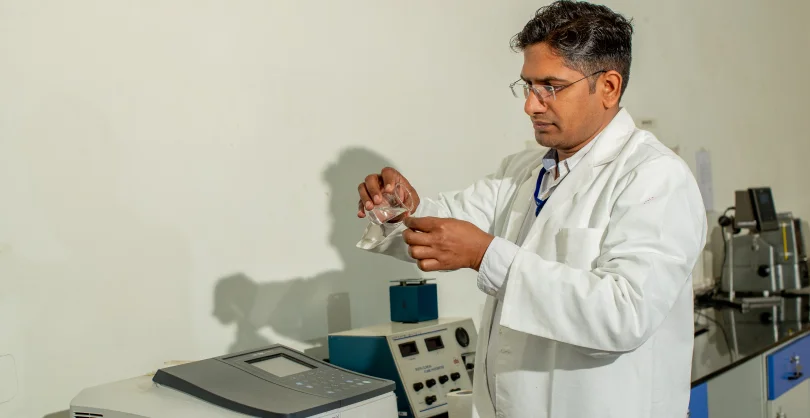OVERVIEW
The Master of Pharmacy (M.Pharm.) in Pharmacology is a two-year postgraduate programme designed to provide an in-depth understanding of drug science and its interaction with biological systems. This comprehensive course covers key aspects of pharmacology, including drug mechanisms, therapeutic applications, and safety evaluation. Students gain hands-on experience through laboratory-based training, pharmaceutical research, and project work, ensuring a strong foundation in both theoretical and practical knowledge. The curriculum is structured to develop critical thinking and problem-solving skills essential for advancements in drug development and clinical research. Graduates of this programme are well-prepared for successful careers in the healthcare, pharmaceutical, and biomedical industries.

Programme Highlights
Explore the Future of
Medicine Production
The curriculum of Master of Pharmacy (M.Pharm.) – Pharmacology is thoughtfully designed with insights from industry insiders, ensuring it is aligned with the current standards of pharmaceutical industries. This comprehensive learning approach integrates an equal balance of both theoretical and practical knowledge, providing students with an all-inclusive foundation in pharmacology. The programme is taught through a combination of lectures, seminars, project, and research-based learning.
Programme Structure
- Modern Pharmaceutical Analytical Techniques
- Advanced Pharmacology-I
- Pharmacological and Toxicological Screening Methods-I
- Cellular & Molecular Pharmacology
- Pharmacology Practical I
- Seminar / Assignment
- Advanced Pharmacology II
- Pharmacological and Toxicological Screening Methods-II
- Principles of Drug Discovery
- Experimental Pharmacology practical- II
- Pharmacology Practical II
- Seminar/Assignment
- Research Methodology and Biostatistics
- Journal Club
- Discussion / Presentation (Proposal Presentation)
- Research Work
- Journal Club
- Research Work
- Discussion / Final Presentation
Connecting Talent to Dream Careers
K.R. Mangalam University has collaborated with various top industry giants like Novozymes, Biocon, Glenmark, Cipla, Himalaya, P&G Health, Lupin, Aurobindo, etc., offering students a platform to secure good internships and placements. Moreover, these organisations also organise training sessions in the university to provide our students with hands-on industry experience and insights.

Career Options
The Master of Pharmacy (M.Pharm.) – Pharmacology programme leads to a variety of career possibilities across various sectors. We equip our graduates with real-world insights and essential skills for specialised roles in the pharmaceutical industry worldwide. Here are some of the prominent career paths that M.Pharm. graduates choose:
Programme
Outcomes
Possess the core and basic knowledge associated with the profession of pharmacy, including biomedical sciences; pharmaceutical sciences; behavioral, social, and administrative pharmacy sciences; regulatory and manufacturing practices
01
Demonstrate effective planning abilities including time management, resource management, delegation skills and organizational skills. Develop and implement plans and organize work to meet deadlines.
02
Honor personal values and apply ethical principles in professional and social contexts. Demonstrate behavior that recognizes cultural and personal variability in values, communication and lifestyles. Use ethical frameworks; apply ethical principles while making decisions and take responsibility for the outcomes associated with the decisions.
03
Utilize the principles of scientific enquiry, thinking analytically, clearly and critically, while solving problems and making decisions during daily practice. Find, analyze, evaluate and apply information systematically and shall make defensible decisions.
04
Apply reasoning informed by the contextual knowledge to assess societal, health, safety and legal issues and the consequent responsibilities relevant to the professional pharmacy practice.
05
Communicate effectively with the pharmacy community and with society at large, such as, being able to comprehend and write effective reports, make effective presentations and documentation, and give and receive clear instructions.
06
Understand, analyze and communicate the value of their professional roles in society (e.g. health care professionals, promoters of health, educators, managers, employers, employees).
07
Understand and consider the human reaction to change, motivation issues, leadership and team-building when planning changes required for fulfillment of practice, professional and societal responsibilities. Assume participatory roles as responsible citizens or leadership roles when appropriate to facilitate improvement in health and wellbeing.
08
Learn select, and apply appropriate methods and procedures, resources, and modern pharmacy-related computing tools with an understanding of the limitations.
09
Understand the impact of the professional pharmacy solutions in societal and environmental contexts, and demonstrate the knowledge of, and need for sustainable development.
10
Recognize the need for, and have the preparation and ability to engage in independent and life-long learning in the broadest context of technological change. Self-assess and use feedback effectively from others to identify learning needs and to satisfy these needs on an ongoing basis.
11
Become professional experts in careers associated to pharmaceutical Sciences, and allied fields, establishing knowhow and compliance.
01
Emerge as leaders, entrepreneurs, and managers, guiding pharma professionals within the healthcare field.
02
Maintain morals & ethics in their professional conduct, thereby taking responsible decisions which endorse the reliability of the professional healthcare person.
03
Support for sustainable practices and engage in environment-friendly methods of dealing with patients in healthcare.
04
Be as decent citizens with high value attributes towards society, demonstrating extraordinary professionalism, as a contribution towards well-being of the society.
05
Understanding theories related to pharmacology and acquiring the knowledge of drugs from natural and synthetic sources, synthesize drugs, explain drug mechanism of action, and understand structure activity relationships and ADMET profile.
01
Applying pharmacological knowledge to assess patient needs and formulate treatment Strategies for monitoring drug therapy and patient responses.
02
Analysing the data from experiments to identify patterns or anomalies in cellular behaviour for targeting various diseases.
03
Evaluating the implications of genetic mutations on cellular function and disease by understanding cellular and molecular mechanism.
04
Designing and executing complex assays for cell viability, apoptosis, and DNA fragmentation by integrating different techniques for evaluating safety and efficacy of drugs.
05
Observing various instrumental and analytical processes for screening of compounds/molecules for their pharmacological activity and evaluation of safety and efficacy for development of novel formulation.
06
Performing the experiments using instruments to identify and quantify the drug present in various biological samples.
07
Frequently Asked Questions
Commence Your Journey
in 6 Simple Steps

Complete payment and submit
Pay the required Application Fee
Take an entrance test
K.R. Mangalam University Entrance Examination (KREE)
Appear for interaction
Attend our Faculty-Led Interview.
Get the admission offer
You will receive the offer letter after the successful interaction
Get Enroled
Be prepared to embark on your journey


















